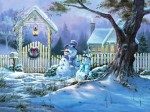 The White Network wishes you and yours a very white Christmas and happy New Year. Between December 12th and the 30th we’ll be running a special program consisting of festive, seasonal music each Wednesday, Friday, and Sunday starting at 9PM ET and streaming until the next scheduled program. Enjoy.
The White Network wishes you and yours a very white Christmas and happy New Year. Between December 12th and the 30th we’ll be running a special program consisting of festive, seasonal music each Wednesday, Friday, and Sunday starting at 9PM ET and streaming until the next scheduled program. Enjoy.
1. Deck the Halls by James Taylor
2. Hark the Herald Angels Sing by Amy Grant
3. Celtic Winter Solstice by Arthur Fiedler & Boston Pops
4. Joy to the World by Anne Murray
5. Jingle Bells by Michael Buble
6. Winter Solstice Song by Lisa Thiel
7. Silent Night by Susan Boyle
8. Carol of the Bells (for 12 cellos) by ThePianoGuys
9. Deck the Halls and Wassail Song by unknown
10. O Come All Ye Faithful by Martina McBride
11. Ring Out Solstice Bells by Jethro Tull
12. O Holy Night by Charlotte Church
13. Twelve Days of Christmas with Ernie Ford
14. Yule Song by Katerina El Haj
15. Silent Night by Michael Buble
16. Hark the Herald Angels Sing by Charlotte Church
17. What Night Is This? By Katerina El Haj
18. Winter Solstice by The Tea Party
19. Deck the Halls by Bing Crosby
20. We Wish You A Merry Christmas by Enya
(Note: There is no audio download for this program – please tune in via the MP3 Stream.)










I enjoyed this so much! And knowing that it’s all music created and performed by our people feels so good.
Some history of the songs:
“Deck the Halls” or “Deck the Hall” (which is the original title) is a Welsh melody dating back to the sixteenth century, and belongs to a winter carol, Nos Galan. The fa la la may originate from medieval ballads.
“We Wish You a Merry Christmas” is a sixteenth-century English carol from the West Country of England. It’s origin lies in the English tradition where wealthy people of the community gave Christmas treats to the carolers on Christmas Eve such as ‘figgy puddings’ that were very much like modern day Christmas puddings.
“Joy to the World” was first published in 1719. The words are by English hymn writer Isaac Watts; the music was adapted and arranged by Lowell Mason in 1839 from an older melody which was then believed to have originated from Handel. As of the late 20th century, “Joy to the World” was the most-published Christmas hymn in North America.
“Hark! The Herald Angels Sing” first appeared in 1739 in the collection Hymns and Sacred Poems, having been written by Charles Wesley.
“O Come All Ye Faithful” (Adeste Fideles) is a hymn tune with unclear beginnings. It has been determined that John Francis Wade is the probable composer. The earliest existing manuscript is from 1751.
“The Twelve Days of Christmas” was first published in England in 1780, but may be French in origin. Twelfth Night is defined by the Oxford English Dictionary as “the evening of the fifth of January, preceding Twelfth Day, the eve of the Epiphany, formerly the last day of the Christmas festivities and observed as a time of merrymaking.”
“Silent Night” was first performed on Christmas Eve 1818 at the St. Nicholas parish church in Salzburg, Austria. A young priest Father Joseph Mohr wrote the lyrics, Franz Xaver Gruber composed the melody.
“O Holy Night” was composed by Adolphe Adam in 1847 to the French poem “Minuit, chrétiens” (Midnight, Christians) by Placide Cappeau. Unitarian minister John Sullivan Dwight created a singing edition in 1855.
“Here We Come A-wassailing” was composed about 1850. The old English wassail song refers to ‘wassailing’, or singing carols door to door wishing good health, while the a- is an archaic intensifying prefix.
“Jingle Bells” was written by James Lord Pierpont in Medford, Massachussets and published under the title “One Horse Open Sleigh” in the autumn of 1857. Even though it is commonly thought of as a Christmas song, it was actually originally written to be sung for Thanksgiving.